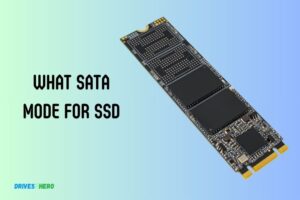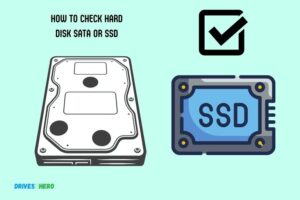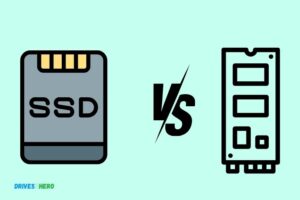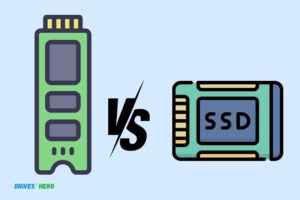Sata 2 Ssd Vs Hdd: Which One Is The Preferable Choice?
When comparing SATA 2 SSD to HDD, SATA 2 SSD wins in terms of speed, durability, and power usage.
Though they might come with a higher price tag, the enhanced performance and longer lifespan make them a worthier investment.
SATA 2 SSD (Solid State Drive) and HDD (Hard Disk Drive) are types of storage devices used in computers.
SSDs utilize flash memory to provide superior speed and performance, while HDDs use magnetic coating and spinning disks to read and write data.
While SATA 2 SSDs may come with a higher upfront cost compared to HDDs, they offer a better performance with faster speed, more durability, and greater power efficiency.
Hence, for those seeking to upgrade their systems’ speed and performance, opting for a SATA 2 SSD over an HDD would be a sound choice.
9 Features Of SATA 2 SSD Vs HDD
| Feature | SATA 2 SSD | HDD |
|---|---|---|
| Speed | Faster than HDD | Slower than SSD |
| Price | More expensive | Less expensive |
| Durability | More durable; no moving parts | Less durable; has moving parts |
| Power Consumption | Lower power consumption | Higher power consumption |
| Noise Level | Silent operation | Can create noise during operation |
| Heat Production | Less heat production | More heat production |
| Data Recovery | Difficult data recovery | Easier data recovery |
| Capacity | Usually lower capacity | Higher capacity |
| Lifespan | Longer lifespan | Shorter lifespan |
Key Takeaway
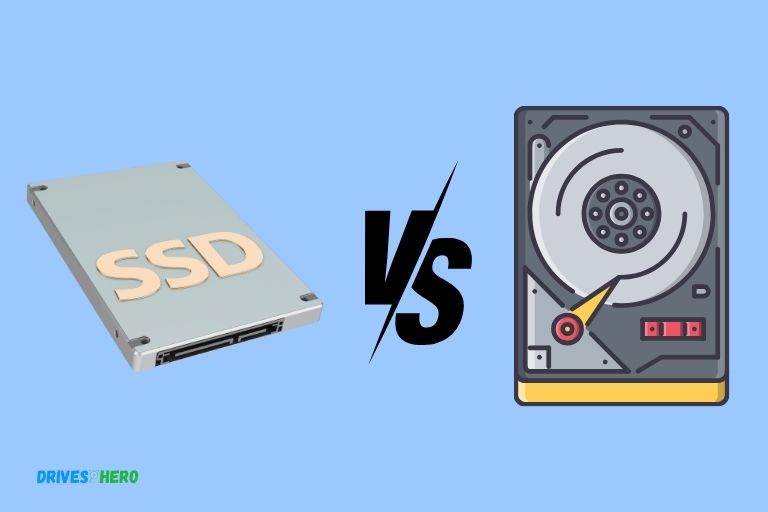
Five Facts About Sata 2 SSD Vs HDD Comparison
Understanding Sata 2 Ssd And Hdd
Sata 2 SSD and HDD are two different storage options, with SSD offering faster data transfer speeds while HDD provides more storage capacity.
Understanding the differences between the two can help you choose the best option for your needs.
Differentiating Solid State Drive (Ssd) And Hard Disk Drive (Hdd)
Solid State Drives (SSDs) and Hard Disk Drives (HDDs) are two primary types of storage devices used in computers.
Understanding the differences between these two can help you make an informed decision when it comes to choosing the right storage solution for your needs.
Let’s delve into the key factors that set SSDs and HDDs apart:
Factors To Consider When Choosing Between Ssd And Hdd
When deciding between an SSD and an HDD, several factors come into play.
Here are some important considerations to help you make the right choice:
- Speed: SSDs utilize flash memory to store data, resulting in significantly faster read and write speeds compared to HDDs. This makes SSDs ideal for tasks that demand quick access to files and applications.
- Reliability: Traditional HDDs consist of moving parts, which can be prone to mechanical failure over time. SSDs, on the other hand, have no moving parts, making them more durable and less susceptible to damage caused by physical shock or vibration.
- Power consumption: SSDs use less power than HDDs, which means they can enhance the battery life of laptops and other portable devices. This advantage makes SSDs particularly beneficial for users who prioritize energy efficiency.
- Storage capacity: HDDs tend to offer larger storage capacities at more affordable prices compared to SSDs. So, if you require a high storage capacity without breaking the bank, an HDD might be the better option.
- Noise level: Due to the absence of moving parts, SSDs operate silently, making them ideal for noise-sensitive environments such as recording studios or libraries. HDDs, on the other hand, can produce audible noise due to their spinning platters and moving mechanical components.
- Price: Although SSD prices have decreased over time, HDDs still offer better value per gigabyte of storage. If you are on a budget and require ample space for storing large files, an HDD can be a cost-effective choice.
Performance And Storage Capacity Comparison
To help you visualize the performance and storage capacity differences between SSDs and HDDs, consider the following:
- SSDs offer faster boot times and faster application launches due to their higher data transfer speeds.
- HDDs are slower when it comes to accessing data since they rely on a mechanical arm and spinning platters to read and write information.
- SSDs are ideal for users who require fast and seamless multitasking capabilities, as they can handle data requests more efficiently.
- HDDs provide cost-effective storage solutions for users who prioritize storing large amounts of data and are not concerned about lightning-fast speeds.
Keep in mind that your choice between an SSD and an HDD ultimately depends on your specific needs, budget, and usage patterns.
By factoring in these considerations, you can make an informed decision and choose the storage solution that best suits your requirements.
Ssd Advantages Over Hdd
SSD offers distinct advantages over HDD, particularly in terms of speed and reliability.
A Sata 2 SSD outperforms an HDD, delivering faster boot times and data transfer rates, making it a superior choice for those seeking enhanced performance.
SSDs (Solid State Drives) have numerous advantages over HDDs (Hard Disk Drives) that make them a popular choice for many users.
We will explore the key advantages of SSDs and how they outperform HDDs in several important areas.
Speed And Responsiveness Of Ssd:
- Faster boot times: SSDs can significantly reduce the time it takes for your computer to boot up, allowing you to start working or gaming faster.
- Rapid file transfer: With SSDs, large files can be transferred more quickly, saving you time on data-intensive tasks.
- Instantaneous application loading: SSDs excel at loading applications quickly, resulting in a snappy and responsive user experience.
Durability And Shock Resistance:
- Solid-state construction: Unlike HDDs, which use spinning disks susceptible to damage, SSDs are built with no moving parts. This design makes them more durable and resistant to shock, vibration, and accidental drops.
- Enhanced reliability: SSDs are less prone to mechanical failures such as head crashes or disk fragmentation, making them a more reliable storage option for long-term use.
- Ideal for portable devices: Due to their shock-resistant nature, SSDs are an excellent choice for laptops, ultrabooks, and other mobile devices, as they can better withstand the rigors of travel.
Lower Power Consumption:
- Energy efficiency: SSDs consume less power than HDDs, resulting in lower energy bills and longer battery life for laptops and other portable devices.
- Reduced heat generation: Since SSDs produce less heat during operation, they help keep your system cool and can contribute to improved overall system performance.
- Environmentally friendly: The lower power consumption of SSDs not only benefits your wallet but also reduces your carbon footprint by decreasing energy consumption.
SSDs have significant advantages over HDDs, including faster speed, enhanced durability, and lower power consumption.
These advantages make SSDs a preferred choice for those looking to optimize performance, reliability, and energy efficiency in their computing experience.
Hdd Advantages Over Ssd
SATA 2 SSDs offer faster data transfer rates and better overall performance compared to traditional HDDs, providing quicker boot times and improved file access speeds.
However, HDDs still have the advantage of larger storage capacities at a more affordable price point.
SATA 2 SSD vs HDD:
When it comes to choosing between a SATA 2 SSD and an HDD, it’s essential to weigh the advantages of each option. Despite the increasing popularity of SSDs, HDDs still offer unique benefits in certain scenarios.
We will discuss the advantages of HDDs over SSDs, focusing on their cost-effective storage solution, higher storage capacity, and compatibility with older systems.
Cost-Effective Storage Solution:
- HDDs are generally more affordable than SSDs, making them a budget-friendly storage option.
- If you require large storage capacity at a reasonable price, HDDs have the edge over SSDs.
- For individuals or businesses with extensive data storage needs, choosing an HDD can help you save costs without compromising on storage capabilities.
Higher Storage Capacity:
- HDDs offer higher storage capacity compared to SSDs, making them ideal for storing large media files, high-quality videos, or extensive software libraries.
- With an HDD, you can easily find models with several terabytes (TB) of storage space without breaking the bank.
- If you deal with massive data sets or require ample storage for your gaming collection, HDDs provide the capacity you need.
Compatibility With Older Systems:
- One of the prominent advantages of HDDs is their compatibility with older systems that may not support SSDs due to their interface or power requirements.
- HDDs with SATA connections can seamlessly connect to legacy systems, allowing you to upgrade storage without needing to overhaul your entire system.
- If you have an older computer or prefer using legacy hardware for specific purposes, opting for an HDD ensures compatibility and hassle-free installation.
HDDs have distinct advantages over SSDs, such as being a cost-effective storage solution, providing higher storage capacity, and being compatible with older systems.
If you prioritize budget-friendly options, require ample storage space, or own older hardware, HDDs serve as a reliable choice.
However, it’s crucial to remember that SSDs excel in terms of speed and durability, making them an appealing option for individuals or businesses with specific performance-related requirements.
Factors To Consider When Choosing Between Sata 2 Ssd And Hdd
When choosing between Sata 2 SSD and HDD, several factors need consideration. These include storage capacity, speed, durability, power consumption, and cost.
Each option has its pros and cons, so it’s essential to evaluate your specific needs before making a decision.
When it comes to storage options, choosing between SATA 2 SSD and HDD can be a tough decision. Both have their own advantages and limitations.
To help you make an informed choice, let’s explore some key factors you should consider:
Budget And Cost Considerations:
- Price: HDDs are generally more cost-effective compared to SSDs, which tend to be pricier due to their advanced technology.
- Capacity: HDDs offer higher storage capacities at a lower price per gigabyte than SSDs.
- Cost per performance: SSDs may have a higher upfront cost, but they provide faster speed and better performance, giving you value for your investment.
Intended Usage And Workload Requirements:
- Speed and performance: If you require faster data transfer and quicker boot times, SSDs are the way to go. They offer significantly faster read and write speeds compared to HDDs.
- Workload type: If your work involves tasks like video editing, gaming, or running resource-intensive software, SSDs can handle heavy workloads more efficiently than HDDs.
- Reliability: SSDs are less susceptible to mechanical failure as they have no moving parts, making them more reliable for critical data storage.
System Compatibility And Interface Limitations:
- Interface compatibility: SATA 2 SSDs and HDDs both use the same SATA interface, ensuring compatibility with most modern systems.
- Physical size and form factor: HDDs are available in larger sizes, such as 3.5 inches, suitable for desktops. SSDs, on the other hand, come in smaller form factors, like 2.5 inches or M.2, which are ideal for laptops or small form factor PCs.
- Interface limitations: While SATA 2 SSDs offer significant performance improvements over HDDs, their maximum data transfer rate is limited by the SATA 2 interface speed. If you require even faster speeds, you may want to consider newer interfaces like SATA 3 or NVMe.
Considering factors such as budget, intended usage, and system compatibility will help you determine whether a SATA 2 SSD or HDD is the right choice for your specific needs.
Performance Comparison: Sata 2 Ssd Vs. Hdd
The performance difference between a SATA 2 SSD and an HDD is significant, with the SSD offering faster read and write speeds, improved overall system performance, and quicker boot times.
The HDD, on the other hand, provides higher storage capacities at a lower cost.Gone are the days when traditional hard disk drives (HDDs) were the only option for data storage.
With the advent of solid-state drives (SSDs), the computing landscape has witnessed a significant boost in performance. We will delve into the key performance factors and compare SATA 2 SSDs with HDDs.
Sequential And Random Read/Write Speeds:
SSDs:
- Rapid sequential read/write speeds enable faster data retrieval and storage.
- SSDs excel in random read/write operations, significantly reducing latency.
- Instantaneous access to files and applications enhances overall system responsiveness.
- The absence of mechanical parts allows for quicker data transfer rates.
HDDs:
- Lower sequential read/write speeds compared to SSDs limit data transfer rates.
- HDDs struggle with random read/write operations, resulting in higher latency.
- Slower access times can cause delays in loading files and launching applications.
- The mechanical nature of HDDs affects overall system response time.
Boot Times And Application Loading:
SSDs:
- Near-instant boot times ensure a quicker start-up experience.
- Applications load swiftly, minimizing waiting periods.
- SSDs excel in multitasking scenarios, enabling seamless working even with several applications open simultaneously.
HDDs:
- Longer boot times due to slower read/write speeds.
- Applications take comparatively longer to load, leading to occasional lags.
- Multitasking performance may be hampered, especially while running resource-intensive applications.
File Transfer And Multitasking Performance:
SSDs:
- Swift file transfer speeds facilitate faster copying and moving of data.
- Multitasking with multiple applications running concurrently is smooth and efficient.
- SSDs handle data-heavy tasks effortlessly, improving productivity.
HDDs:
- File transfer speeds are slower, resulting in longer times for data copy and movement.
- Multitasking can be challenging, especially when dealing with resource-intensive applications.
- HDDs may struggle to handle large files or multiple tasks simultaneously, leading to decreased efficiency.
So, when it comes to overall performance, SATA 2 SSDs outshine traditional HDDs in sequential and random read/write speeds, boot times, application loading, file transfer, and multitasking.
The faster access and data transfer rates offered by SSDs contribute to a smoother and more responsive user experience, making them the preferred choice for modern computing needs.
Storage Capacity Comparison: Sata 2 Ssd Vs. Hdd
SATA 2 SSDs offer higher storage capacity compared to HDDs, making them a preferred choice for storing large amounts of data.
With faster data transfer speeds and improved performance, SATA 2 SSDs are a reliable solution for users looking to enhance their storage capabilities.
When it comes to choosing the right storage option for your computer, understanding the storage capacity is crucial.
Both SATA 2 SSD and HDD offer different storage capabilities, and finding the perfect balance between storage needs and budget constraints is essential.
We will compare the maximum storage capacity of SATA 2 SSD and explore the various storage capacity options available with HDD.
Maximum Storage Capacity Of Sata 2 Ssd
SATA 2 SSDs are known for their speed and efficiency, but they generally have limited storage capacity compared to HDDs.
Here are some key points to consider:
- SSDs typically come in capacities ranging from 120GB to 2TB.
- The maximum storage capacity of an SATA 2 SSD is around 2TB.
- With an ample storage space of 2TB, you can store a substantial amount of data, including documents, photos, videos, and even large software applications.
- However, it’s important to note that the price increases as the storage capacity of an SSD increases. So, if you require a larger storage capacity, you must be prepared to pay a higher price.
Hdd Storage Capacity Options
HDDs, on the other hand, offer a wide range of storage capacity options, making them an attractive choice for those who require a significant amount of space without breaking the bank.
Here are some key points to consider:
- HDDs usually come in capacities ranging from 500GB to 16TB or more.
- The maximum storage capacity of an HDD can go up to 16TB or even higher in some cases.
- With such high storage capacity options, HDDs are well-suited for storing large amounts of data, such as high-resolution videos, games, and multimedia content.
- Since HDDs have been around for a longer time, they have become more affordable compared to SSDs with higher capacities. This makes them a cost-effective choice for users with considerable storage needs.
When it comes to storage capacity, SATA 2 SSDs generally offer a maximum capacity of around 2TB, while HDDs provide a wide range of options, including capacities up to 16TB or more.
Selecting the right storage option depends on your specific requirements, balancing the need for storage space with your budget constraints.
Selecting The Right Storage Solution: Sata 2 Ssd Vs. Hdd
Selecting the right storage solution is crucial: Sata 2 SSD offers faster data transfer and improved performance compared to HDD.
Its compact size and durability make it an ideal choice for those seeking speed and reliability in their storage needs.
Solid State Drives (SSDs) and Hard Disk Drives (HDDs) are two popular storage solutions, each with its own set of advantages and considerations.
When choosing between a SATA 2 SSD and an HDD, it is essential to assess your priorities and requirements, analyze the cost-performance tradeoff, and consider your future storage needs.
Let’s dive deeper into each of these factors to help you make an informed decision:
Determining Your Priorities And Requirements:
- Consider your need for speed: SSDs are known for their lightning-fast performance, offering significantly faster data transfer rates compared to HDDs.
- Assess the importance of durability: SSDs have no moving parts, making them less susceptible to physical damage and providing greater reliability.
- Evaluate your storage capacity requirements: HDDs tend to offer larger storage capacities at a lower cost per gigabyte, making them a suitable choice for those needing ample storage space.
Assessing The Cost-Performance Tradeoff:
- SSDs generally offer higher performance but come at a higher cost per gigabyte compared to HDDs. Consider your budget and prioritize your storage needs accordingly.
Determine the level of performance you require:
- SSDs excel in tasks that demand quick data access, such as booting up the operating system, launching applications, and transferring large files.
- If you require large storage for media files, photos, or videos, HDDs can provide a cost-effective solution without compromising performance.
Considering Future Storage Needs:
- Anticipate your future storage requirements: As technology advances, file sizes tend to increase. Evaluate whether an SSD’s faster performance and smaller storage capacity will adequately meet your future needs.
Reflect on your upgrade options:
- SSD technology continues to evolve rapidly, offering higher capacities and improved performance over time. Conversely, HDD technology has matured and offers fewer advancements.
- Keep in mind that upgrading an SSD can be more costly than replacing an HDD due to the higher price per gigabyte.
Remember, selecting the right storage solution depends on your specific needs and priorities.
Take into account factors such as performance, durability, and storage capacity to make an informed decision that aligns with your requirements and budget.
Conclusion: Making An Informed Decision
When comparing a Sata 2 SSD to an HDD, it is crucial to make an informed decision. Explore the differences in performance, speed, and storage capacity to choose the best option for your needs.
When it comes to choosing between a SATA 2 SSD and HDD, weighing the pros and cons is essential to make an informed decision.
Let’s take a closer look at the advantages and disadvantages of each storage solution:
Weighing The Pros And Cons Of Sata 2 Ssd And Hdd:
SATA 2 SSD:
- Faster performance: SSDs offer significantly faster read and write speeds compared to HDDs. This means quicker boot times, faster application launches, and improved overall system performance.
- Reliability: Since SSDs have no moving parts, they are more durable and less prone to mechanical failures. This makes them ideal for laptops or portable devices where vibrations and bumps can occur.
- Compact and lightweight: SSDs are smaller and lighter than HDDs, making them a great choice for sleek and slim devices like ultra-thin laptops or tablets.
- Energy-efficient: SSDs consume less power compared to HDDs, resulting in longer battery life for laptops and reduced overall electricity costs.
HDD:
- Lower cost per gigabyte: HDDs are considerably cheaper than SSDs, making them an attractive option for those on a tight budget or needing large storage capacities.
- High storage capacity: HDDs offer larger storage capacities than SSDs, making them suitable for storing large media files such as movies, photos, or music libraries.
- Widely compatible: HDDs are compatible with a wide range of devices and operating systems, making them versatile and easy to integrate into existing systems.
- Longevity: Traditional hard drives have been around for decades and have a proven track record of durability, with some models lasting for several years.
Final Considerations For Choosing The Right Storage Solution:
While both SATA 2 SSD and HDD have their strengths and weaknesses, here are some key factors to consider before making your decision:
Consider your usage: If you prioritize speed and performance, and your budget allows, an SSD is the way to go.
On the other hand, if you need a large storage capacity at an affordable price, an HDD might be the better choice.
Evaluate your storage needs: Determine the amount of storage you require. If you have extensive media collections or work with large files, an HDD’s higher capacity may be necessary.
However, if you primarily use cloud storage or have minimal local storage needs, an SSD’s smaller capacity might suffice.
Think about your device: Consider the device in which you’ll be using the storage solution. If you have a laptop or portable device, an SSD’s durability and lightweight nature make it an attractive option.
For desktop PCs or storage arrays, HDDs’ larger capacity and lower cost per gigabyte might be more suitable.
Budget: This plays a crucial role in decision-making. SSDs are typically more expensive than HDDs, so ensure your budget aligns with your preferred storage solution.
By thoroughly assessing the pros and cons of SATA 2 SSD and HDD and considering your specific needs, you can choose the right storage solution for your requirements.
FAQ On Sata 2 Ssd Vs Hdd
Is Sata 2 Ssd Faster Than Hdd?
Yes, SATA 2 SSD is faster than HDD because it uses flash memory, enabling quicker data retrieval.
Is A Sata Ssd Better Than A Hdd?
Yes, a SATA SSD is better than an HDD. It offers faster speeds, improved performance, and better durability.
Is Sata 2 Enough For Ssd?
Yes, SATA 2 is sufficient for an SSD.
Is Sata 2 Fast Enough For Hdd?
Yes, SATA 2 is fast enough for HDD.
What Are The Advantages Of Using A Sata 2 Ssd Over An Hdd?
SATA 2 SSDs offer faster read/write speeds, improved performance, increased durability, silent operation, and energy efficiency.
Conclusion
Solid state drives (SSDs) and hard disk drives (HDDs) both have their own advantages and limitations.
SSDs are known for their incredible speed and enhanced performance, providing quick boot times and rapid data transfer rates. On the other hand, HDDs have larger storage capacities and are more cost-effective.
Choosing between the two ultimately depends on your specific needs and budget. If you require faster performance and can afford to pay a little extra, an SSD is the way to go.
However, if you require more storage space and are working with a limited budget, an HDD might be the better option.
Ultimately, the choice between an SSD and HDD will have a significant impact on the overall performance and storage capacity of your system.
Understanding the differences between the two will help you make an informed decision and ensure that your computer meets your unique requirements.

